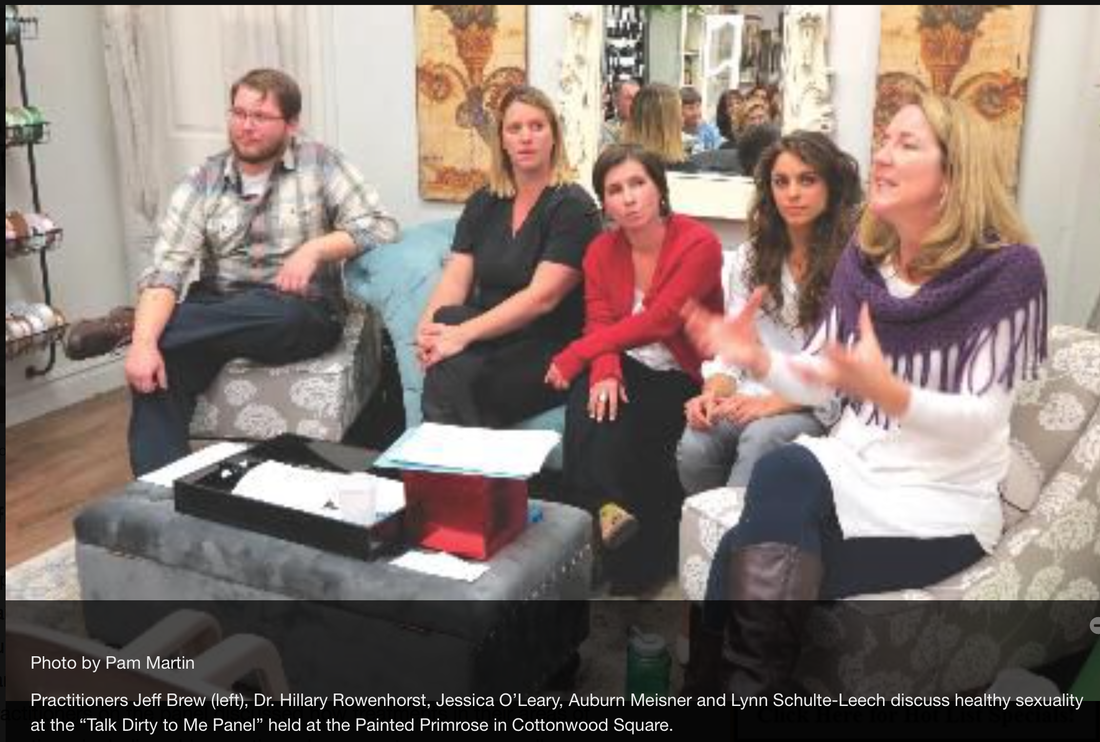 On the evening of November 15th, Intimate Inquiries presented a sex positive panel to the community at The Painted Primrose. It was a wonderful and interactive evening with a higher turn out than we had seats for! Click here to read the wonderful article that Pam Martin wrote after attending the event and interviewing some of the presenters and audience members. Here is the article quoted from the Left Hand Courier's website: Photo & Article by Pam Martin "Talk Dirty to Me" Panel Sheds Light on a Charged Subject A panel discussion on sexual health was held Tuesday, Nov. 15 at the Painted Primrose in Cottonwood Square. Facilitated by local sex therapist Auburn Meisner, topics for the evening focused on physical and emotional barriers to intimacy within the context of healthy relationships. Practitioners on the panel discussed how treatments in their areas of expertise—including chiropractic and acupuncture care, as well as physical and talk therapies—can achieve lasting benefits in the quality of lives of their respective clientele. Panelists talked about how stress impacts the population’s collective sympathetic nervous system, inhibiting our bodies’ ability to be open to, and experience pleasure. Chiropractic adjustments and acupuncture treatments, according to Dr. Hillary Rowenhurst and licensed acupuncturist Jeff Brew, can help rebalance the sympathetic nervous system, allowing the fight-or-flight response to relax its grip, enhancing physical and emotional wellbeing. Rowenhurst kicked off the discussion with a case study about a 50-year-old male client who’d come to see her about lower back pain. She explained that chiropractic treatment is about keeping the nervous system healthy and functioning, and adjustments for this client, specifically to his L3 vertebrae, allowed for more blood flow to the critical area. His pain subsided and for the first time in a while he was able to maintain an erection, with beneficial results to his relationship and sense of self. Lynn Schulte-Leech, a physical therapist who specializes in women’s health, talked about postpartum issues that can adversely affect a new mother’s pelvic area. Muscles become strained during birth, especially challenging ones—the sit bones swing out to the sides, the sacrum’s affected, she explained, or there’s scar tissue resulting from vaginal tearing or Cesarean section. The tissue in the region becomes immobilized, resulting in pain during intercourse. A very simple exam followed up with exercises for the muscles in the pelvic floor, which help tissues to relax and loosen up, can make radical improvements in reducing or eliminating pain. Schulte-Leech added that she’s bothered by a medical establishment that examines women with these symptoms and tells them everything looks normal without checking for tissue mobility. Doctors might recommend a new mother drink some wine or use more lubrication prior to intercourse, when there’s a physiological tweak that doesn’t allow the pelvic floor muscles to relax. Clients can come to see Schulte-Leech and “it usually takes just one session,” she said, before they’re on the road to recovery. Jessica O’Leary is a gerontologist who discussed a client in his 70s who was suffering from Alzheimer’s disease. He’d been acting inappropriately with some of his female caregivers. “What could have been construed as a perversion,” O’Leary explained, was in fact a behavior that masked “a need for more intimacy.” When the man’s wife began to spend more quality cuddling time with him, the behaviors disappeared. We’re human and we come wired with a need for the warmth of intimate connection. “Hug your friends,” O’Leary encouraged the audience, “get regular massages.” As regards appropriate touch, she held up her hands, “get manicures and pedicures; listen to music, dance, light candles. Think about ambience. Get naked and hold each other. Flirt. Be playful.” There was also talk about the challenges teenagers face today, with the preponderance of girls taking and posting objectifying selfies on social media, as well as gender identity issues, sexting, and the ready availability of pornography on the web. “We don’t learn how to drive by watching ‘The Fast and the Furious,’” Meisner cautioned the audience, and similarly, “We don’t learn to have sex by watching porn.” Studies, Meisner continued, “have proven that the more parents talk to their kids about these topics, the more delayed their sexuality is.” She holds a globalized, “name it, don’t shame it,” attitude to all discussions about sex. She also argued that technology has influenced the younger generation’s ability to read emotional cues, with people staring at screens and phones instead of looking into each other’s eyes, where the truth is easy enough to read if you know how. Meisner hosted the panel to answer any questions the public might have about her therapy practice, Intimate Inquiries, which is located on Second Avenue in Niwot. Members of the audience said they’d come out to hear an open discussion on an important topic. Denver resident Mark Wiegers said he and his girlfriend, Dia Kline, thought it would be fun. “Straight up bald curiosity” is what brought them out, he said. Wiegers’ verdict on the panel: “Not so dirty, but quite human.” Writen by Pam Martin from the Left Hand Valley Courier
0 Comments
Leave a Reply. |
AuthorAuburn R. Meisner is a LCSW, CST specializing in Sex & Relationship Therapy Archives
March 2021
Categories |



 RSS Feed
RSS Feed


